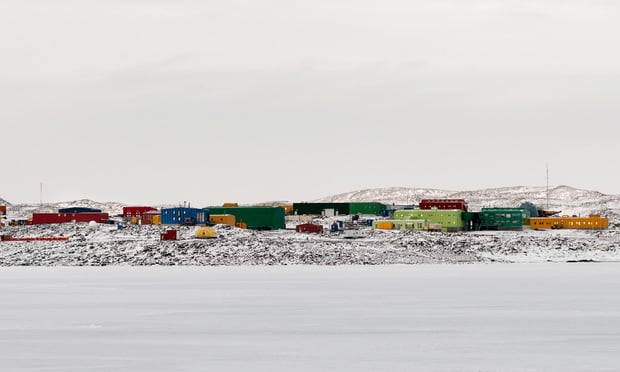 Davis Station, Antarctica (Photo: Shutterstock)
Davis Station, Antarctica (Photo: Shutterstock)
In another time and place, before "coronavirus" and "social distancing" became part of the everyday vocabulary, one leader learned crucial lessons that apply to leaders and managers today. Rachael Robertson was the youngest and only second female expedition leader at Davis Station, Antarctica, in charge of leading a diverse workforce in one of the world's most extreme and isolated workplaces.
She was presented with employees of different professions and skills, from scientists to tradespeople, of different generations, religions, and cultures, and told to "turn them into a team." The author of two books about her experience, she discussed what it was like to work in the Antarctic as Station Manager of the Australian Antarctic research base–and how the skills and strategies she developed apply in many ways to our here and now.
BENEFITSPRO: How did you end up working in Antarctica?
RACHAEL ROBERTSON: It was quite by accident. The Australian Antarctic Division was recruiting station leaders for the next year's expedition. They were looking for general managers with extensive leadership experience. Knowledge of Antarctica wasn't necessary–lucky for me as I'd only been around snow once in my life, on a school excursion.
 Rachael Robertson
Rachael RobertsonWhat intrigued me was the fact they recruited for personal attributes over technical ability. The Antarctic Division figured they could teach you about environmental policy or waste management or the Antarctic treaty during the three months of training. But they couldn't teach you resilience, integrity and empathy.
I decided then and there to apply for the job. Not because I wanted it. But I had a fiendish plan to get as far as the job interview so I could learn what questions they were using and bring them back to my organization. I was managing a team of customer service staff and struggling to recruit people with resilience and empathy. This was my brilliant and foolproof plan.
Except, as I soon discovered, they don't have a job interview. They have a week-long boot camp in a remote mountain area. It was designed to pile the pressure on to see how we'd cope. Imagine my surprise when they offered me the job. I was 35 years old, single, my house was a rental, so I figured 'why not?' I just decided I would rather "regret what I did, than regret what I didn't do."
What was one of the toughest leadership challenges you faced?
In summer, when there were 120 people on the station, a plane crashed. A bolt sheared off the landing gear. It stranded four of my people 300 miles away. They had 10 days' worth of food on board, but we had four days of blizzards and I was responsible for leading the search and rescue.
I realized my team was watching me, taking cues from my behavior about whether to be worried or not about their four colleagues. My body language and words needed to instill confidence. Additionally, I needed to be seen about the place – even though I wanted to hunker down and manage the search and rescue, I needed to be seen to be leading.
It's no different to what leaders are experiencing today. It's a leadership legacy moment – how we handle returning from isolation back to the office will be long remembered by our people.
We got our four expeditioners back on Day 5 but it was a lesson for me on the importance of not just leading through adversity, but also being seen to be leading in a very public manner.
What skills did you have or need to develop to deal with life there?
Resilience and self-awareness are top of the list. You need the ability to understand what you can control and influence versus what you have no control over.
So many things happen outside your control, particularly weather events, which we call the 'A' factor. I would plan for a plane to take scientists into the field to do their sampling, then a blizzard arrives and all plans are off. You need to learn how to deal with that.
Self-awareness is also critical. The interpersonal pressure is huge, and we have no privacy there. The ability to know and understand what pushes your buttons is important because it means you can remove yourself from a situation before it escalates.
Equally, the ability to know how you are perceived by others is very important. It's like standing on a balcony and looking down and watching yourself – you need that level of self-awareness because we are living so closely with a team of very diverse people.
What lessons learned can you offer managers dealing with the "new normal" now, and after the pandemic ends?
The most important thing is to understand there will be a spectrum of responses to returning to work. Some people will be thrilled to be back to a new normal. Others will be scared; some ambivalent.
I recommend leaders ask their people how excited they are about the new normal on a scale of 1 to 10 and notice the difference. Also, physical contact will be an interesting dynamic. For single people living alone, and not being able to visit family and friends, it may have been months without even a handshake. On the other hand, there will be the people craving human interaction and desperate for a hug. We need to respect that difference.
My number one tool for leaders is to implement a culture of No Triangles — which simply means, I don't speak to you about him. You don't speak to me, about her. If someone has done something to upset you, then you have the professional courtesy and respect to go directly to that person. You don't take it to a third party.
For leaders, this frees up time and energy, which means they can focus on the important things that need to be done that add value to the team or business.
What lessons learned can you offer workers?
Manage your bacon wars! We had a major dispute that threatened to shut down the station: Should the bacon be soft or crispy? The team wanted me to call a staff meeting to decide how it should be cooked on Mondays, when the chef had the morning off.
When I asked a few more questions, I got to the bottom of it and discovered one team thought the other team was deliberately cooking the bacon the opposite way to what they wanted, just to irritate them. So the issue was actually about respect – they were feeling disrespected. It manifested in the bacon.
Every workplace has their Bacon Wars. They are seemingly small, irrelevant issues that grate on people but build up until they become distractions and affect productivity. It may be dirty coffee cups; people who are consistently late for meetings; people playing on phones while someone is presenting…they appear to be small offences but in reality they are usually a symptom of a deeper issue.
In the past we may have just put up with them, but I fully expect as we return to the office after an extended absence these bacon wars will be magnified. My advice to workers is to raise the issue, discuss it, sort it out and put it to bed. When you are going through sudden change as we all have now, there is enough to deal with without these annoying behaviors which are really symptoms of a deeper issue–a lack of respect. Speak up.
About your books – what seems to resonate with people?
Both of my books are full of stories from Antarctica. The first book, Leading on the Edge, is a leadership book full of practical tools that I used to build a strong, high-performing team from a group of random strangers. This book became an international bestseller in a matter of weeks because it's a practical, easy to read book. I kept getting emails from people telling me how much it had changed their lives, so I wanted to know why and how.
The second book, Respect Trumps Harmony, quantifies the impact of implementing my tools, like No Triangles. We surveyed 200 teams from across different industries and sectors. I was stunned by the results–100% of the teams said the tool built respect, improved morale and encouraged innovation. The other part that astounded me was 89% said it freed up time and energy, and in 30% of cases it freed up to an hour a day.
Would you go back?
I loved the experience, and I don't regret it for one second. But the scrutiny of the leadership role, where you are being watched all day, every day, for a year, was exhausting. I never had a day off and was on call 24/7 for over a year. There is simply no ability to say, "I don't feel like leading today, I'm going have a day off."
I learned to manage my boundaries better and not automatically respond to the 'have you got a minute?' request (because it's never a minute). I realized if I was available to the team every second, then eventually I would burn out. I needed to have some boundaries that protected my time and space to ensure I was mentally strong enough to lead these folks around the clock.
What would you say to people who wonder if they could do something on a similar level to challenge themselves?
I truly believe it's better to regret what you did, than regret what you didn't do. Whether it's a job promotion, online dating, learning a new skill, moving to a new country, it's always better to have a go. If it doesn't work out you can always make another decision. That's much better than living your life wondering 'what if?'
In terms of career opportunities I ask myself two questions. The first is, do I truly have the capability that's expected and required? Can I actually do this? If you think you can, you go for it. Even if you only have 80 percent of the capability, you'll pick up the rest on the job with mentoring and training and experience.
The second question is, can I acquire that capability in time? I knew I had the ability to lead people. I'd been doing that for 16 years. But I wasn't sure if I could get my head around Antarctic science and the Antarctic treaty and managing complex capital works programs.
It was then a case of saying, Okay, have I got time to learn that? We had three months of predeparture training, and in between, I was reading and learning every spare minute. So, when I asked myself the question, can I learn all of this technical knowledge in time? I realized, yes I could. If my answer had been different, if I didn't feel competent or confident that I could learn all I needed to know before we set sail, then I would have passed up the opportunity.
What was the most important leadership lesson you learned?
In Antarctica, my performance review was conducted by a third party, a psychologist. That person meets privately with every person on the expedition team and asks about my performance as leader. When I sat down with the psychologist and asked her, "Well, what did they say?" She said, "They said you were inspiring."
I asked, "What about me is inspiring?" Was it how I handled the plane crash? She said no.
"Was it that I worked 16 hours a day through summer every day for four months?" No.
"Was it that I changed some policies so that we had a lot more transparency around how resources were allocated? Or was it the masterpiece of an Excel spreadsheet I had for our rosters?"
She said, "Well… Richard mentioned that his kid had a concert back in Australia and the next morning when you saw him, you asked him if he phoned home to find out how was Lachie's concert. Martine mentioned that you knew the names of all 120 people on your station over summer and where they were from. Dallas mentioned that one time he was on kitchen duty mopping the floors and still going at 9 o'clock at night, and you came in to get a cup of tea and put a few chairs on the table to help–you didn't say anything, you just helped him out."
My initial thought was, "So I didn't have to work 16 hour days." But it made me realize it was the moments that they remembered about living and working with me for a year, and what they found inspiring were the small interactions that occurred on a daily basis. The moments that matter.
I thought to be an inspiring leader you needed to be an extrovert, to have a big personality. Now I realize it's not about personality or introverts and extroverts. It's about making people feel valued
As the wonderful Maya Angelou said: "I've learned that people will forget what you said, people will forget what you did, but people will never forget how you made them feel."
© 2025 ALM Global, LLC, All Rights Reserved. Request academic re-use from www.copyright.com. All other uses, submit a request to [email protected]. For more information visit Asset & Logo Licensing.








